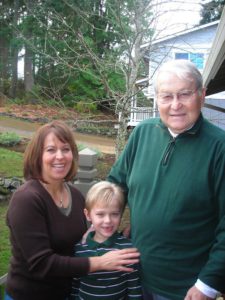No Regrets: Caregiving 101...Tracy Cram Perkins' Dementia Home Care

Dementia Home Care: How to Prepare Before, During, and After
Caregiving a loved one who's dying...with No Regrets
I was an early entrant into the Sandwich Generation. When my dad was wheeled off an airplane to me, he was very ill. At that moment, I was unceremoniously dropped smack-dab between caring for my sick and dying 75 year-old father and my five year-old son. My friend group shifted almost overnight to those who were about 30 years older than me, who both knew my father and had themselves simultaneously cared for their own parents and (mostly) grown children. Some had performed those feats of magic while also juggling their careers as I was doing at the time.
To say I was busy was a complete understatement.
I was overwhelmed, exhausted, and also honored to care for him and my young son.
Tracy Cram Perkins, author of “Dementia Home Care: How to Prepare Before, During and After” has a caregiving expertise honed in the trenches. She cared for both of her parents and her uncle through each of their separate illnesses and deaths. Her hands-on, step-by-step guidance is invaluable to caregivers and those who love them.
True, my father was not diagnosed with dementia. He had the twin sentence of cancer and congestive heart failure. My father lived Larger than Life, he was a former Stanford University football player and also a former Marine Corps Officer who ran his own business for nearly 40 years. So, it was surprising to say the least for me to realize that his healthcare journey did, for sure, affect his cognition. No one prepared me for that one.
Tracy offers tangible advice, step-by-step, in ways that follow the disease progression. You’ll learn how to get ready and get good advice on to live during and after caregiving for your loved one with dementia or Alzheimer’s disease. Yet, as important, this advice is also helpful to anyone caring for their loved one with a terminal illness. No matter what the disease is, the process toward dying follows a specific arc. Tracy’s guidance applies to anyone who is a caregiver. My father arrived, literally, with a gym bag FULL of medication. He would go off-the-air after taking a ridiculous amount of medication in the morning and not emerge until nearly dinner time.

Author Tracy Cram Perkins wrote that "we (family caregivers) are America's largest (unpaid) healthcare provider."
That lasted about 10 days until I could get an appointment with a new physician and pharmacist who trimmed the meds by about half and then helped me stagger them so I wouldn’t lose him during the day. Within the first month, I had my dad back. We were laughing and talking about football and military docudramas over dinner each night with my son. Oh, it was fun.
Tracy will walk you through this process and many other situations – from dealing with delusional behavior to daily sundowners’ syndrome – and she’ll help you remember that laughter really is the very best medicine.
Her chapter on distraction techniques is spot on, as is her chapter on Knowing When to Say When. We all try to say we’re “fine” but there is a time to get respite care and there may be a time to move your loved one to an assisted living community or other form of care, such as hospice. For me, there was a time that I listened to the prompting of my heart and moved my father to a studio apartment in an assisted living facility. It gave him a balance of privacy, social interaction with peers, and nearby medical help if needed. I got so much more help then. Later, when he was actively dying, my then seven year-old son didn’t have to experience a death like that at such a young age. After my father died there were still so many things ahead of me – Tracy’s chapters on the management of “digital estates” and the experience of when your caregiving role is over, will be extremely helpful to you.
I don’t regret a minute of the time I cared for my dad.
My regrets are simple. I wish I’d taken videos of him and captured his voice while talking – my son said that his voice was the first thing he missed and the first thing he forgot. Wisdom from a seven year-old! Along with videos, of course I wish we had more time.
Like Robert Frost wrote, I chose the road less traveled by – when the social worker tracked me down and talked to me about my father’s needs, I didn’t hesitate to offer that he come live with my son and I. But, oh, how I wish I had a guidebook, like this one, to help me prepare for my caregiver role. This guide will help you chart an intentional journey with your caregiver role.
Thank you, Tracy Cram Perkins, for sharing your caregiving insights with us, all.
Check out Amazon for Tracy's guidebook, Dementia Home Care: How to Prepare Before, During, and After.

